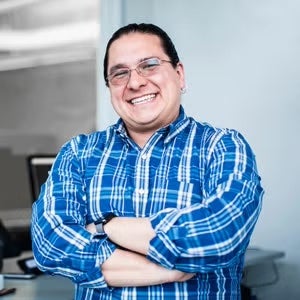Professor Information
Chris Eliasmith is a Professor jointly appointed in Philosophy and Systems Design Engineering and the Canada Research Chair in Theoretical Neuroscience. He is the Founding Director, Centre for Theoretical Neuroscience. His lab is the Computational Neuroscience Research Group (CNRG). The CNRG is interested in understanding how the brain works and exploiting that understanding to improve AI. Research at the CNRG focusses on perception, action, cognition, navigation, and key theoretical issues from a neural perspective. Much of this research is carried out by building large-scale neural models of various brain areas. The main software tool we use and developed for this purpose is Nengo (nengo.ca). The books Neural Engineering and How to Build a Brain summarize the main theoretical approaches we take. We recently proposed the Legendre Memory Unit (LMU) and Spatial Semantic Pointers (SSPs) based on our understanding of brain function. Both are helping to improve state-of-the-art results in deep learning.
-
Theoretical Neuroscience
-
Computational Neuroscience
-
Neuromorphics
-
Spiking Neural Networks
-
Cognitive Modeling
-
Human Factors & Biomedical
-
Modeling & Simulation
-
Pattern Analysis
-
Machine Intelligence & Robotics
-
Signal & Image Processing
-
Operational Artificial Intelligence
-
Robotics
Lukasz Golab is a Professor in the Department of Management Sciences and is cross-appointed to the Cheriton School of Computer Science. He holds a Canada Research Chair in Data for Good. Before joining Waterloo, he was a Senior Member of Research Staff at AT&T Labs. He has a BSc in Computer Science from the University of Toronto (2001; with High Distinction) and a PhD in Computer Science from the University of Waterloo (2006; with Alumni Gold Medal for top PhD graduate).
-
Data science
-
Data systems
-
Artificial Intelligence
-
NLP (hate speech detection / sentence simplification / text mining)
-
Decentralized and high-speed data systems (blockchains / real-time analytics)
-
Blockchain
-
Educational data mining
Plinio Morita is an Associate Professor in the School of Public Health Sciences. He is the Director of the Ubiquitous Health Technology Lab (UbiLab), that has a research focus on population level surveillance, remote patient monitoring (RPM), and personalized medicine technologies to be used to prevent unnecessary visits to hospitals and drive our healthcare system toward community care and telehealth. The current state of the technology limits how clinicians can use data collected from RPM and IoT systems as the quality, frequency, and reliability of the data is normally lower than clinical standards.
- Technology-driven population-level surveillance
- Precision medicine and data science
- mHealth and wearable technology design
- Ubiquitous sensors for smart homes
- Usage data and health data analytics
- Technology for aging
- Persuasive technology
Chrystopher Nehaniv a Professor in the Department of Systems Design Engineering. He is the founder of the Waterloo Algebraic Intelligence & Computation Laboratory (WAICL), and with Prof. Kerstin Dautenhahn, a co-founder of the University of Waterloo's Social and Intelligent Robotics Research Laboratory (SIRRL). Professor Nehaniv is also a member of the Waterloo AI Institute and the steering committee of the Waterloo Institute for Complexity and Innovation (WICI). He serves as Associate Editor for the journals BioSystems, IEEE Transactions on Cognitive and Developmental Systems, Interaction Studies, and Complexity, and previously as Topic Editor-in-Chief of the International Journal of Advanced Robotic Systems for the topics of AI Robotics and Human-Machine/Robot Interaction, and has served on the IEEE Task Force for Artificial Life and Complex Adaptive Systems since its founding in 2003, as Chair (2012-2018), Vice Chair (2018-), and on the IEEE Cognitive and Developmental Systems Technical Committee (2019-) of the IEEE Computational Intelligence Society.
-
Algebraic Methods in Algorithms & Applications
-
Artificial Intelligence
-
Artificial Life & Complex Adaptive Systems
-
Algebra & Discrete-Event Dynamical Systems:
-
Automata, Permutation Groups, Transformation Semigroups, Interaction Machines, Models of Time
-
Systems Biology & Neuroscience: Mathematical & Computational Methods
-
Gene-Regulatory Networks & Differentiated Multicellularity
-
Interactive Systems Design
-
Cognitive Architectures for AI Robotics
-
Enactive Experiential & Temporally Extended Intelligence
-
Evolvability
-
Cognitive/Social/ Skill & Linguistic Development in Animals & Artifacts
-
Dynamic Networks
-
Whole-Part Relations/Natural Subsystems
-
Global Hierarchical Coordinate Systems for Understanding/Prediction/Manipulation in STEM
General fields of application of the research programs include:
-
Artificial intelligence
-
Big data
-
Population and health system studies
-
Computational omics



